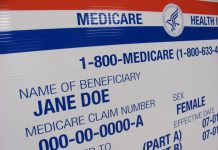Rhett Krawit has spent more than half of his life battling leukemia. He’s now six years old, and is in remission. While he’s doing okay so far, his parents to make sure he stays that way during the current measles outbreak. They want officials in Rhett’s school district to tell unvaccinated kids to stay home.

Rhett attends Reed Elementary School in Tiberon, California–roughly half an hour north of San Francisco. His father, Carl, told KQED in San Francisco that it may be several months before Rhett can be vaccinated, since three years of chemotherapy have severely weakened his immune system. With the help of Reed Elementary’s school nurse, Carl made sure that all of the kids in his class had their shots up to date. A pretty mundane task, right? Well, Tiberon is located in Marin County, which is one of the biggest pockets in the nation for anti-vaccine nonsense. This year, 6.45 percent of Marin’s kindergartners have personal belief exemptions on file, which allow them to legally start school without having at least one vaccine. That’s the highest rate of any county in the Bay Area, and one of the highest in the state. At Reed alone, 7 percent of kindergartners have PBEs.
That didn’t sit well with Carl. As he sees it, the issue is rather simple.
“If you choose not to immunize your own child and your own child dies because they get measles, OK, that’s your responsibility, that’s your choice. But if your child gets sick and gets my child sick and my child dies, then … your action has harmed my child.”
Carl’s ordeal is similar to that of Fiona Stone, who wasn’t able to vaccinate any of her kids for some time because her middle child has an autoimmune condition, and the therapy he had to undergo weakened his immune system to the point that it was too risky for his two siblings to be vaccinated.
Robert Goldsby, an oncologist at the University of California, San Francisco who has been overseeing Rhett’s care, said that Carl’s concerns were far from idle. He said that there are dozens of other Bay Area kids who are going through cancer therapy. Like Rhett, they can’t be vaccinated due to their weakened immune systems. As a result, Goldsby says, “they have to rely on their friends and colleagues and community to protect them.” He added that when people ask what they can do to help when they find out a child has cancer, his response is always the same–“One of the main things they can do is make sure their [own] kids are vaccinated to protect others.”
Carl and his wife, Jodi, wrote Steven Herzog, superintendent of the Reed Union School District, and asked him to consider making it district policy to require that all students in the district be immunized as a condition of enrollment unless they’re medically unable to be vaccinated. Herzog responded with a classic non-answer answer, only saying that the district would “take whatever actions necessary to ensure the safety of our students.” Although a high school in Huntington Beach told its unvaccinated students to stay home in the wake of the recent measles outbreak, that came after one of its students caught the disease. However, Marin County health officer Matt Willis indicated that if the outbreak progresses, he’s willing to at least consider requiring unvaccinated kids to stay home even if there aren’t any confirmed cases at a specific school.
Carl recalls a meeting at his daughter’s school just before the start of the year. At that meeting, staffers repeatedly told the parents that their kids couldn’t bring peanut products to school due to the risk of peanut allergies. Carl immediately asked if he could get assurance that all kids at his school were vaccinated. Incredibly, he found out later that several parents pitched a fit about it since they didn’t vaccinate their kids. If you’re finding it hard to understand that disconnect, don’t worry. So am I. No one even bats an eyelash at bans on bringing food due to the risk of food allergies. How is requiring that your kids be vaccinated any less important? I’d really like to know the answer to that question.





